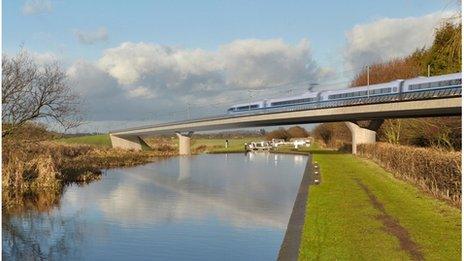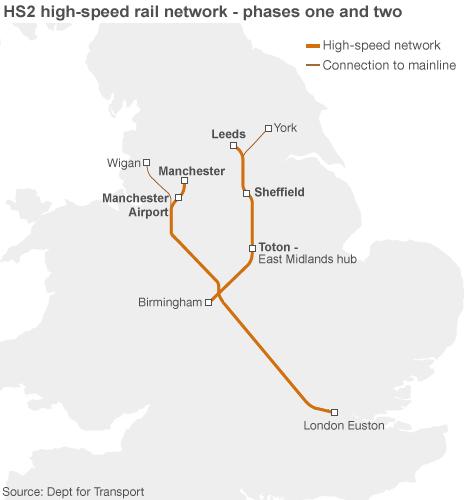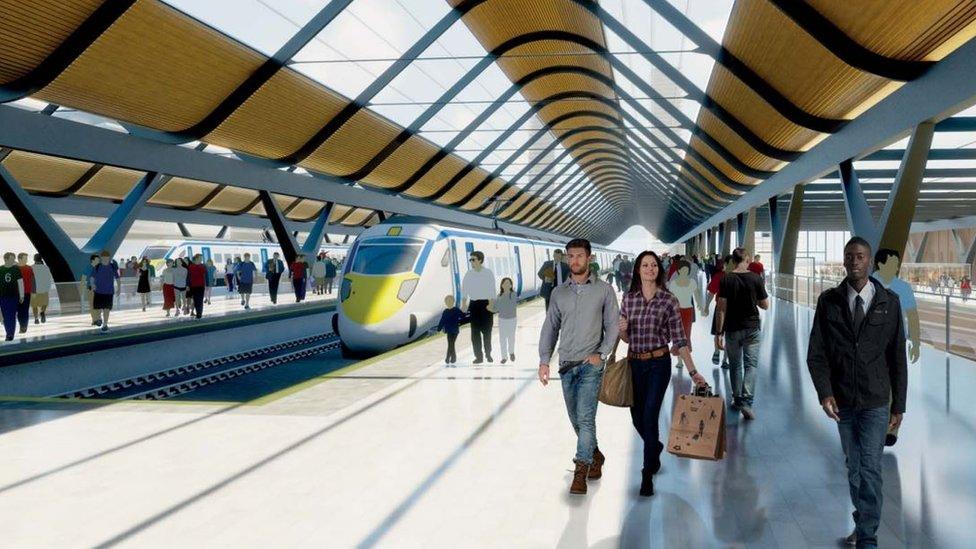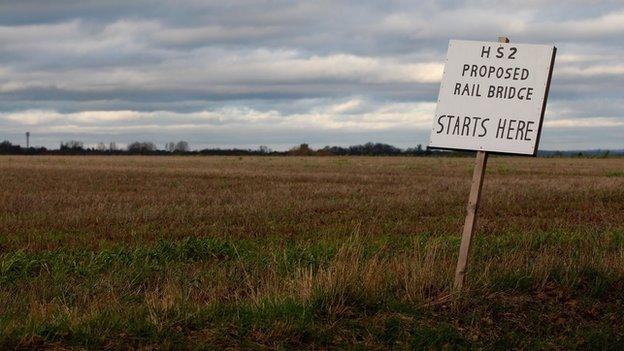HS2 ruling 'a victory' despite unlawful compensation move
- Published
- comments

HS2 is due to carry 400m-long (1,300ft) trains at speeds of up to 250mph
A High Court ruling into government consultations on the planned HS2 rail scheme is a "landmark victory" for the project, the rail minister has said.
The government won nine out of 10 points being challenged, which Simon Burns said effectively gave the "green light" to the high-speed rail project.
However, the consultation into compensation for those affected was ruled "unlawful" by Mr Justice Ouseley.
Anti-HS2 group 51m has been granted leave to appeal on two counts.
The London to Birmingham section of the rail £33bn rail project aims to be running by 2025.
The second phase, north from Birmingham in a Y-shaped extension to Manchester and Leeds, could be operational by about 2032-33.
The Department for Transport said that HS2 phase two would virtually halve journey times between Birmingham and Manchester - to 41 minutes - and between London and Manchester from two hours and eight minutes to one hour and eight minutes.
Under the plans, speeds of up to 250mph on HS2 would reduce a Birmingham to Leeds journey from two hours to 57 minutes, while phase one will cut London-Birmingham travel to 49 minutes, from the current one hour and 24 minutes.
But critics argue that HS2's predicted economic benefits have been overestimated by the government, and suggest swathes of picturesque countryside will be blighted by the railway.
The objections brought to court also included the claim that the government failed to adequately assess alternatives to the scheme.

Five judicial reviews were brought by four protest groups, including 18 councils, campaign group High Speed 2 Action Alliance (HS2AA), which represents more than 70 affiliated groups and residents' associations, and a golf club.
They had claimed there were failures in the consultation process and in assessing the high-speed link's environmental impact.
'National interest'
Speaking after the judgement, Mr Burns said the judge had delivered a "convincing decision... on all the key issues of the way in which the Department for Transport has handled the moving forward of HS2".
He told the BBC: "He has given us the "green light" to move forward... subject to the necessary parliamentary approvals.
"That is good news, because the project is in the national interest."
Richard Houghton of HS2 Action Alliance tells the BBC's Mike Sergeant it is important ''not to believe the spin''
Mr Burns confirmed the government will not appeal against the compensation ruling. Instead, the DfT will hold another property consultation "picking up the points" raised by the judge on Friday.
The department insisted the re-running of the consultation "will not affect the HS2 construction timetable in any way".
During the hearing, the judge identified 10 grounds raised in the five cases.
He rejected nine of the points, including claims the line breached European environment and habitat rules.
But he ruled in favour of HS2AA regarding the nature of the consultation into compensation of householders living along the proposed route, saying "the consultation on compensation was so unfair as to be unlawful".
'Years of dither'
About 172,000 properties within 0.6 miles (1km) of the first phase are alleged to be affected by "HS2 blight".
Hilary Wharf, director of HS2AA, said the judgement was "a huge victory for the hundreds of thousands of people whose lives are blighted by HS2".
She added: "The government must now go back to the drawing board and rethink its approach to compensation.
Rail minister Simon Burns said the decision effectively gave HS2 a "green light"
"There are many better compensation alternatives which would help all those up and down the country trapped by HS2."
Shadow transport secretary Maria Eagle accused the government of a "botched" consultation which had contributed to "three years of dither and delay" over the HS2 project.
She said: "It is right that this vital infrastructure project can now proceed once ministers have re-run the part of the consultation that they botched.
"It is vital that the government now gets on with introducing the necessary legislation to make this scheme a reality on the ground. When they do so, they will have cross-party support from Labour."
One of the failed challenges was from Camden Council in north London, which had concerns that the proposals for Euston station would be detrimental to the local ethnic minority community.
Its leader, Sarah Hayward, said: "We are disappointed with this judgment and will continue to fight this fundamentally-flawed scheme."
- Published6 October 2023

- Published24 July 2012
- Published10 January 2012

- Published29 January 2013
